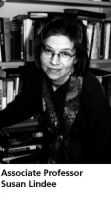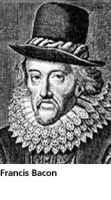

Assessing the Slippery Slopes of Knowledge
"We are not to imagine or suppose," Francis Bacon wrote four centuries ago, "but to discover what nature does or may be made to do." Bacon was contending against the speculative traditions of medieval scholasticism. Setting forth a new doctrine, a better "engine," for the attainment of knowledge, he was one of the earliest and most articulate proponents of what has come to be called scientific method. "Nature," he declared, "exhibits herself more clearly under the trials and vexations of art [experimentation] than when left to herself."
"The basic historical story," says Susan Lindee, "is that the Scientific Revolution of the seventeenth century brought together the labor of the mind, or thought, with the labor of the hand, which is experiment. They produced this incredible flowering of knowledge." Lindee, a science historian, is associate professor and acting undergraduate chair in Penn's Department of History and Sociology of Science. The hybrid discipline uses the tools of the humanities and social sciences to study science and technology.
"One of the central premises of science is that it produces absolute truth, absolute knowledge," Lindee remarks. The classical story holds that science, from the beginning, has pushed back the frontiers of ignorance with a steady, incremental, and sublime advance of knowledge. "What's clear from the research of the past 15 or 20 years in the field is that we come to know that things are true in many different ways. And it is not solely a process of intellectual coming to know, but it is also a process of social coming to know." By probing the historical and sociological context of doing science apart from its epistemological claims for discerning objective truth, scholars have developed a better understanding of science as a human enterprise. Just like art, poetry, religious liturgy, and advertisement, science can be seen as a product of culture and studied as such.
Making science an object of academic scrutiny does not call into question the legitimacy of scientific truth, acknowledges Lindee, but it does provide a critical perspective on an endeavor that has profoundly changed, and continues to affect, our world. Scientists have not always received kindly the insights of this upstart discipline. Only scientists can assess science, they seem to argue. If you're not trained in a scientific field and fully socialized into the scientific community, you can't speak for science.
It's not a view Lindee shares. Science studies combine the savvy outsider's naiveté of a journalist with a scholar's patient and exhaustive scrutiny. "If you're completely enrolled in the scientific community," she says, "you're not going to have the distance that permits you to think critically about what this enterprise is and what its place in modern society and modern culture is."
Before obtaining a doctorate in the history and philosophy of science from Cornell, Lindee was a journalist for ten years. Beginning as a beat reporter in Texas, her home state, she eventually wound up doing magazine writing on scientific, medical, technological, and environmental issues. Although she enjoyed reporting, what turned her to scholarship was the desire for a greater depth of understanding. "Sometimes I would finish a story, and I would see all the other questions that I could have asked and all the other things I could have explored." For a journalist, tight deadlines never permitted enough time to gather up and follow all those extraneous but intriguing threads.
 "Historians of science are interested in things like how knowledge is produced," she says. "We take as our subject the systems--intellectual, ideological, social, institutional--that permit scientists to reach conclusions about what natural truth is." In the 18th century, for instance, class and gender played important roles in determining who was considered a reliable producer of knowledge, Lindee explains. Science was largely the province of the aristocracy, and only a "gentleman," because he was wealthy and independent, was seen as a fitting "testifier to the truth of nature."
"Historians of science are interested in things like how knowledge is produced," she says. "We take as our subject the systems--intellectual, ideological, social, institutional--that permit scientists to reach conclusions about what natural truth is." In the 18th century, for instance, class and gender played important roles in determining who was considered a reliable producer of knowledge, Lindee explains. Science was largely the province of the aristocracy, and only a "gentleman," because he was wealthy and independent, was seen as a fitting "testifier to the truth of nature."
Today the presumption is that only a person with the proper credentials, an "expert," can be a credible speaker of scientific truth. Such a person would ordinarily need to have a Ph.D. in a relevant field, and they must have the appropriate institutional affiliation, which would mean an academic institution or corporate laboratory. Without these, she says, a person propounding a scientific truth would not be interpreted as a reliable knower, and they certainly wouldn't appear as an expert commentator on the evening news, even if what they had to say were correct. "So to some extent," notes Lindee, "things become true about nature because of who says them, and we know whether they can be trusted or believed because of the social and institutional place of the individual making the claim."
Lindee's point is not a postmodernist challenge, a radical assertion that all knowledge is relative. But it does recognize that knowledge is not simply the intellectual output of Bacon's scientific engine. "I have great faith in science," she insists. "The scientific process is interesting because it produces such astonishing knowledge. My particular claim is not that scientific knowledge has no value, that it isn't powerful, but that it's mediated, it's mitigated, it's not always clear which part is truth." The social, political, and historical milieu that produces knowledge is both a powerful engine and a problematic one. "We know some things because of culture and society and politics," she asserts, "and there are things we don't know because of culture and society and politics."
Most of the undergraduates who major in the history and sociology of science are studying to be professional scientists. Over half are pre-med. Lindee believes the academic program helps them become more sophisticated scientists. "It seems to me very important that they understand that science as an institution has a history, that the standards for making decisions about nature have changed through time, that the rules for conducting research and writing scientific papers are historical conventions. It's important for them to be aware of the role that social belief can have in shaping what kinds of questions they ask and what kinds of solutions seem compelling or interesting. Nature is incredibly complicated, and science does the best it can. We value that enterprise--but don't turn the enterprise into a church; don't turn it into the equivalent of dogma."

In 1995, Lindee, along with Dorothy Nelkin, her thesis advisor now at NYU, published The DNA Mystique: The Gene as a Cultural Icon. The study looks at how a biological entity, the gene, has entered into popular consciousness--through TV shows, advertisement images, media stories, and other vehicles of popular culture--and assumed a broader cultural meaning than what scientists attribute to its strictly biological properties. In popular narratives, there are genes for criminality, smoking, divorce, shyness and selfishness, intelligence and its absence, watching television, homosexuality, and so on. In their book, the authors point out not just that the gene as represented in the popular mind is at variance with scientific fact, but that these accreted, symbolic meanings are having profound effects on personal decisions and institutional policy--on court rulings, public policy, insurance decisions, corporate and employment practices, education policy, and other areas. "By elevating DNA and granting it extraordinary powers of agency and control," the authors write, this cultural icon limits social choices by erasing complexity and ambiguity.
And it's not just through the mass media that these notions and narratives are conveyed and reinforced. "Scientists are not off the hook in this," insists Lindee. "They have been actively involved in the construction of an extremely powerful, compelling gene that explains everything," although it's not because scientists deliberately seek to mislead the public. "There's not this one place where the truth is located--but the way it's interpreted, the way it's framed, varies. There's the kind of truth you tell in a scientific paper; there's what you say to Congress; there's how you popularize research in an interview; there's what you say when you appear on a bioethics panel. Those are stories that you tell about what nature is and what truth is. They're important; they're revealing; they matter; we should care about them a lot."
Lindee points out that American society has been undergoing what she calls a "cultural renegotiation of science" that stems from a postwar disappointment with its promise. Besides the many conveniences and startling discoveries yielded by scientific research, society has been chastened by troubling and unintended side effects attending that "progress." A population explosion was unleashed by advances in medicine; extensive environmental destruction is underway in the wake of industrialization; the development of the atomic bomb let loose an arms race that threatens global catastrophe. In the 1960s, movements within scientific circles as well as grass roots activity by lay and consumer groups began to undermine and reconfigure the contract between science and society. Says Lindee: "What that shift is saying is that science needs to be thinking about ethics; scientists need to be thinking about the implications of what they do and incorporate within it values that are humane."
One aspect of the shift in science studies has been the growth of a feminist perspective. "The premise of some feminist critiques of science," notes Lindee, "is that what now needs to be incorporated into science is caring labor. Just as the combined labor of the head and the hand transformed the kind of knowledge that was produced, the inclusion of the labor of the heart could further transform knowledge."
Another lover of science, while not a feminist, made a similar observation. "If you would learn the secrets of nature," wrote Thoreau, "you must practice more humanity than others."